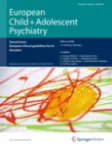| Titre : | Affect dysregulation in cannabis abusers: A study in adolescents and young adults (2008) |
| Auteurs : | G. DORARD ; S. BERTHOZ ; O. PHAN ; M. CORCOS ; C. BUNGENER |
| Type de document : | Article : Périodique |
| Dans : | European Child and Adolescent Psychiatry (Vol.17, n°5, August 2008) |
| Article en page(s) : | 274-282 |
| Langues: | Anglais |
| Discipline : | PSY (Psychopathologie / Psychopathology) |
| Mots-clés : |
Thésaurus mots-clés ADOLESCENT ; ETUDE CAS-TEMOINS ; CANNABIS ; ETUDE CLINIQUE ; COMORBIDITE ; TROUBLES EMOTIONNELS ; PSYCHOPATHOLOGIE ; DEPENDANCE ; ANHEDONIE ; AFFECTThésaurus géographique FRANCE |
| Résumé : | Psychiatric comorbidity and impaired emotional functioning have been previously reported in adult substance abusers but have been less well documented in adolescents. Thus, we investigated mental health problems and emotion regulation abilities in adolescents and young adults with cannabis dependence. Moreover, we explored the relationships between consumption modalities and affective style. Therefore, 32 cannabis abusers (CA) and 30 healthy controls completed a battery of self-reports measuring depression (BDI-13), anxiety (STAI-Y), alexithymia (TAS20; BVAQ-B), anhedonia (PAS; SAS), and sensation seeking (SSS). The MINI was administered to evaluate cannabis dependence and axis I DSM-IV comorbid diagnoses. A semi-structured clinical interview was given to determine psychoactive substance use. Statistical analyses revealed that more than half of the CA reported at least one other non-drug or alcohol comorbid diagnosis. The most common were mood and anxiety disorders. CA subjects scored significantly higher on all affective dimensions except alexithymia total scores; however, they had greater scores for the two subscales measuring the difficulties in identifying feelings. Logistic regressions demonstrated that CA subjects were more likely to experience high levels of trait anxiety, physical anhedonia and sensation seeking than the controls. Various correlations were observed between the affective scores and the substance considered. The amount of substance use and, particularly, the prevalence of polydrug use we observed are alarming. This study demonstrates that cannabis dependence in adolescents and young adults is related to a great psychological distress and specific emotional dimensions and puts emphasis on the importance of substance use prevention as early as middle school. (Author's abstract) |
| Domaine : | Plusieurs produits / Several products |
| Refs biblio. : | 45 |
| Affiliation : | Laboratory of Clinical Psychopathology and Neuropsychology, Paris Descartes University, Institut Henri Pieron, Boulogne Billancourt, France |
| Centre Emetteur : | 13 OFDT |
| Cote : | A03812 |
 Accueil
Accueil



